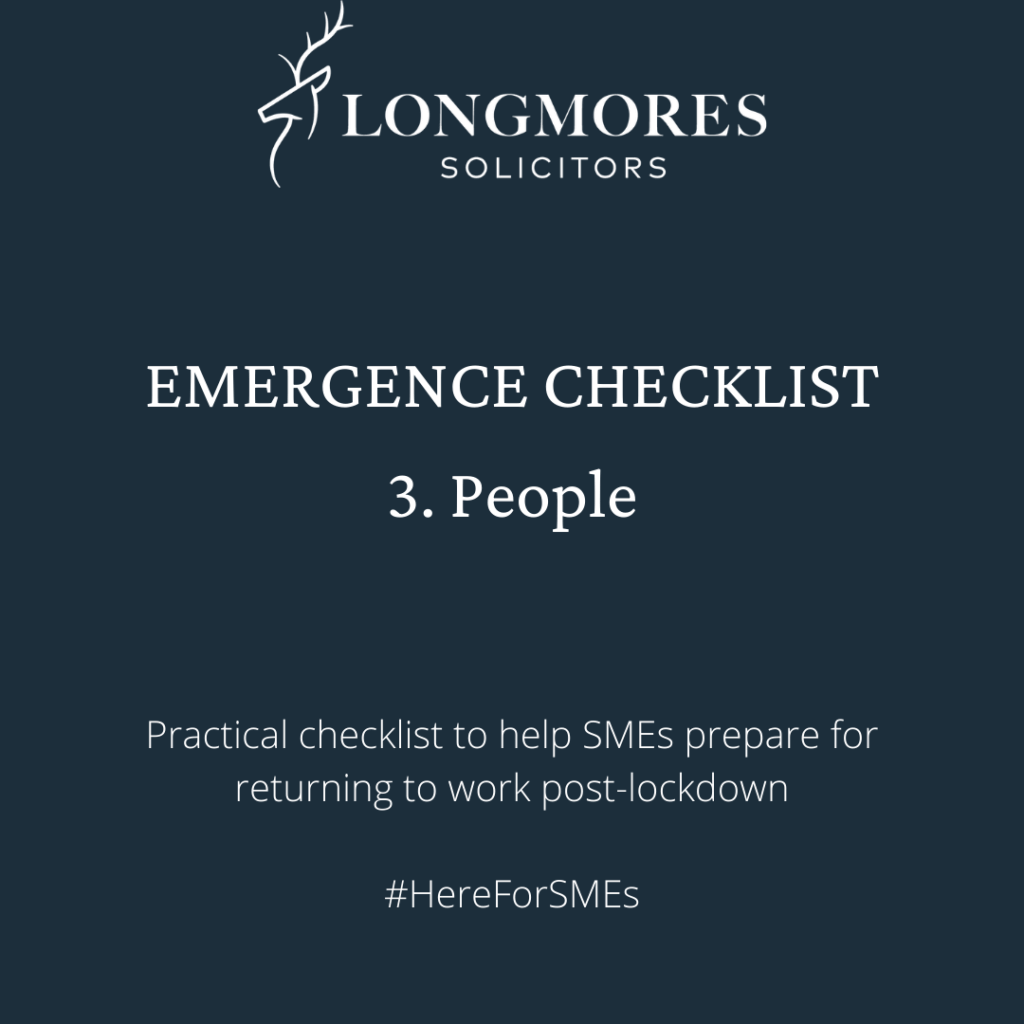Emergence Checklist – 3. People
Your people are crucial to the success of your business. Your staff have become used to having more autonomy during the lockdown. They have experienced more practical and flexible work routines, hours and expectations.
Businesses need to think about how they can adapt their ‘old ways’ and blend them with the best of the ‘lockdown ways’ to create ‘new ways’. It is an opportunity for businesses to re-imagine how they operate and also to look at different ways to utilise their people and their skills for the benefit of their business and their customers.
We have set out below a helpful checklist to help you prepare your business for the ‘post lockdown’ era. In the third of this series of four blogs, we focus on your people.
Checklist
1. How will you re-shape your employees’ appraisals and technical work reviews?
In lockdown, we focussed our effort – rightly so – on protecting our mental health. We need to now assess technical aptitude.
2. Have you considered the practicality of getting back to work?
Will your teams want to return to work? How will you manage this process? Consider childcare arrangements – your office may reopen before e.g. schools and nurseries.
3. Re-socialising back to the workplace: furloughed and non-furloughed staff
Plan to manage any friction that may arise between those staff that have been furloughed, and those who have not. Consider the social implications of COVID-19 – and manage expectations e.g. seating arrangements, lunch, breaks, and the need for shift cycles. Recognise the contributions that have been made by both groups. How will you re-establish a structure and routine for both groups? E.g. meetings, dial-ins, Town Halls.
4. Motivation & employee engagement – how will you keep your teams engaged and motivated?
Have you managed to capture quantitative data on employee engagement during the lockdown? What are your plans to ramp up communication and engagement, and make people feel more involved?
5. Will you provide welcome packages and corporate gifts?
How will you ensure that your staff feel valued, and welcome in the office? Can you draw on your experiences of managing the return to work experience for other life events (e.g. maternity)? Will you supply gifts on desks (e.g. wine/chocolate/post cards/coasters)?
6. What ongoing support will you have in place for wellbeing?
(Bereavements, Divorces, Trauma) – Are your managers equipped to help support their teams? Are your managers living your values? How will you re-socialise your values and, do you need to reassess your culture?
7. Will we all return to the previous work environment?
Have you considered the possibility that not everybody will return to the office? What arrangements are you considering?
8. Management and leadership – communication and expectation?
Are your managers and supervisors equipped and empowered to positively lead your teams? What training have you considered to equip them with soft skills?
9. Health & Safety – COVID-19 infection control
Have you complied with the legal duty to review your risk assessments and record the significant findings in light of the pandemic? Can people continue to work at home? If not, can you arrange the workplace to achieve social distancing? Have you considered collective and personal protective equipment, and hygiene policies and procedures? Have you trained your staff on your health and safety processes? What are your policies on response to and reporting of an infection affecting the workplace? Consider the usage of PPE outside the workplace e.g. on public transport – will you supply PPE to your employees for this purpose?
If you are an employer or employee and need advice about issues connected to the pandemic, please contact Richard Gvero.
Request a full copy of the report including all four checklists.
Please note the contents of this blog are given for information only and must not be relied upon. Legal advice should always be sought in relation to specific circumstances.

